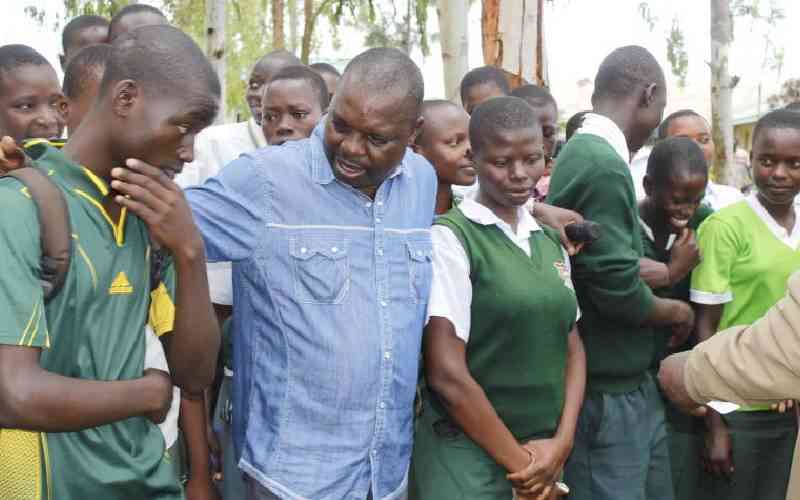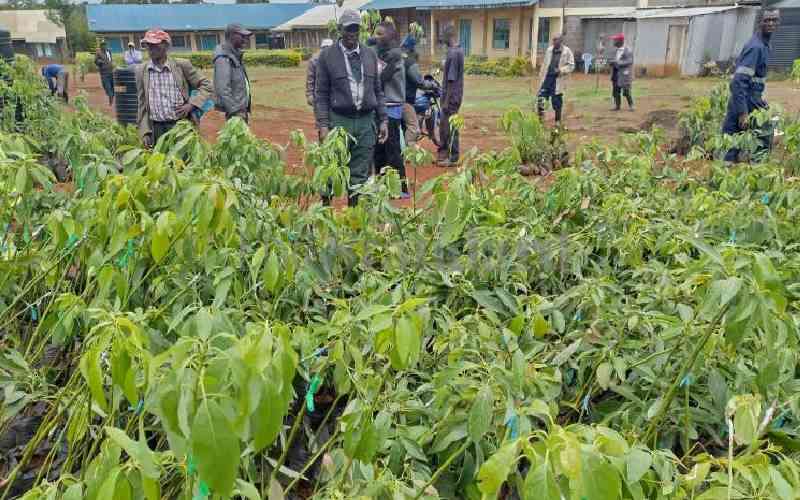Farming may not be Bondo MP Gideon Ochanda’s main occupation but some of the innovations in his two-acre farm have left his constituents impressed—one of them a professor in agriculture.
Ochanda’s primary motivation is not to make money from the farm by the shores of Lake Victoria. He is more interested in demonstrating to his constituents that farming does not necessarily need a lot of time and effort for one to be successful.
His is farm is quite small, therefore he has to utilise every available space to plant trees like mangos that earn him a tidy sum when the fruit is in season.
Jungle green
But it is the MP’s recent venture in banana farming that has got his constituents talking. Unlike most of his neighbours, Ochanda does not plant the ornamental two or three banana trees in his garden. His farm is a jungle green of tissue culture bananas.
Tissue culture is a method of producing plants from roots, leaves or stems under sterile conditions. Tissue culture is mostly done for plants under the threat of extinction, but it has found its way to mainstream food production.“I decided to experiment with tissue culture bananas and my crop is now eight months old. Four months into the project, neighbours began to show an interest in my farm,” says the legislator.
Ochanda’s closest neighbour, an agriculture professor at Great Lakes University in Kisumu, was one of the first to reach out. “He felt this was a good idea and took it up. Another neighbour quickly followed suit. As we speak, I have 800 circuses and my two neighbours have 400 each,” he says.
The fact that people around him have realised that tissue culture bananas have better yields than the indigenous breed pleases him. But why this special interest in tissue culture bananas? “Tissue culture bananas mature fast. While normal indigenous bananas grow for two years, tissue culture matures in eight months,” Ochanda says.
In addition, more than four stems shoot out from a single seedling in one hole. Since it is advisable to get rid of the extras by planting them in their own holes, the MP donates some stems to neighbours.
“Each stem should have a maximum of four circuses. I have decided to donate the extra ones,” he says. Ochanda expects to earn Sh600 for each bunch of bananas once his crop is ready for harvest.
Four from one
“Thanks to the circus, I expect each plant to have another stem after every two months. This will be the trend until I exhaust the four of them. By the second year, I will have harvested four times from my initial seedling,” he says.
Ochanda expects that the bananas will sell out like the proverbial hot cakes.
“These types of bananas are not planted in Bondo. Our people get tissue culture bananas from as far as Molo. I believe I will have a readily available market, just like my mangoes which people buy from my doorstep,” he says.
Ochanda’s main goal is to use his farm to encourage his constituents to take up farming as an alternative to formal employment.
Stay informed. Subscribe to our newsletter
“In other areas, young people are getting into commercial farming. There is more money there than in most white collar jobs,” he says.
“It is just a matter of attitude. I believe time will force people to stop thinking about office work and embrace farming. I will sell one bunch of already mature bananas at a minimum of Sh600 and I have over 800 stems. You can calculate how much I will earn from my venture,” Ochanda says.
But how does he get time from his busy parliamentary schedule in faraway Nairobi to tend to his plants?
Ochanda says tissue culture banana farming is not labour intensive, therefore, the two labourers he has hired to tend his farm are adequate.
With the expected bumper harvest, and the money he makes from mangoes, Ochanda might just turn Bondo into a model commercial farming constituency.
 The Standard Group Plc is a
multi-media organization with investments in media platforms spanning newspaper
print operations, television, radio broadcasting, digital and online services. The
Standard Group is recognized as a leading multi-media house in Kenya with a key
influence in matters of national and international interest.
The Standard Group Plc is a
multi-media organization with investments in media platforms spanning newspaper
print operations, television, radio broadcasting, digital and online services. The
Standard Group is recognized as a leading multi-media house in Kenya with a key
influence in matters of national and international interest.
 The Standard Group Plc is a
multi-media organization with investments in media platforms spanning newspaper
print operations, television, radio broadcasting, digital and online services. The
Standard Group is recognized as a leading multi-media house in Kenya with a key
influence in matters of national and international interest.
The Standard Group Plc is a
multi-media organization with investments in media platforms spanning newspaper
print operations, television, radio broadcasting, digital and online services. The
Standard Group is recognized as a leading multi-media house in Kenya with a key
influence in matters of national and international interest.






